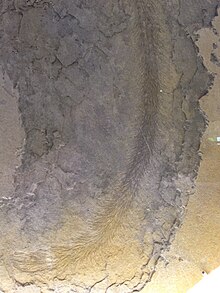Baragwanathia
|
Baragwanathia Temporal range: Early Ludlow (Gorstian, late Silurian) - Early Devonian |
|
|---|---|
 |
|
| Artificial Baragwanathia model | |
 |
|
| Fossil of Baragwanathia found in Victoria, Australia | |
| Scientific classification | |
| Kingdom: | Plantae |
| Division: | Lycopodiophyta |
| Class: | Lycopodiopsida |
| Order: | Drepanophycales |
| Family: | Drepanophycaceae |
| Genus: |
Baragwanathia † W.H.Lang & Cookson, 1935 |
| Species | |
|
|
Baragwanathia is a genus of extinct plants of the division Lycopodiophyta of Late Silurian to Early Devonian age (427 to 393 million years ago), fossils of which have been found in Australia, Canada and China. The name derives from William Baragwanath who discovered the first specimens of the type species, Baragwanathia longifolia at Thomson River (Victoria, Australia).
Baragwanathia differed from such taxa as Asteroxylon by the presence of vascular tissue in its leaves—Asteroxylon had enations without vascular tissue. The sporangia were borne in the axils of the leaves, which were spirally arranged. By comparison, the closely related genus Drepanophycus of the same period (see Drepanophycaceae for more details) bore its sporangia on the upper surface of specialized leaves known as sporophylls. Baragwanathia varied in size, with stems up to a few cm in diameter and up to a few metres in length. They were erect or arched, dichotomized (forked) occasionally, and had adventitious roots arising directly from prostrate stems. As in Asteroxylon the vascular bundle in the stems was an exarch actinostele, with a star-shaped arrangement of tracheids of a primitive annular or helical type (so-called G-type). Leaves were unbranched strap-shaped microphylls (4 cm long in B. longifolia) with a single prominent vascular thread, arranged spirally on the stem. The sporangia were borne in the axils of the leaves, broader than long, dehiscing by a transversely-orientated slit. Spores were trilete isospores. The gametophyte of Baragwanathia is currently unknown.
...
Wikipedia
